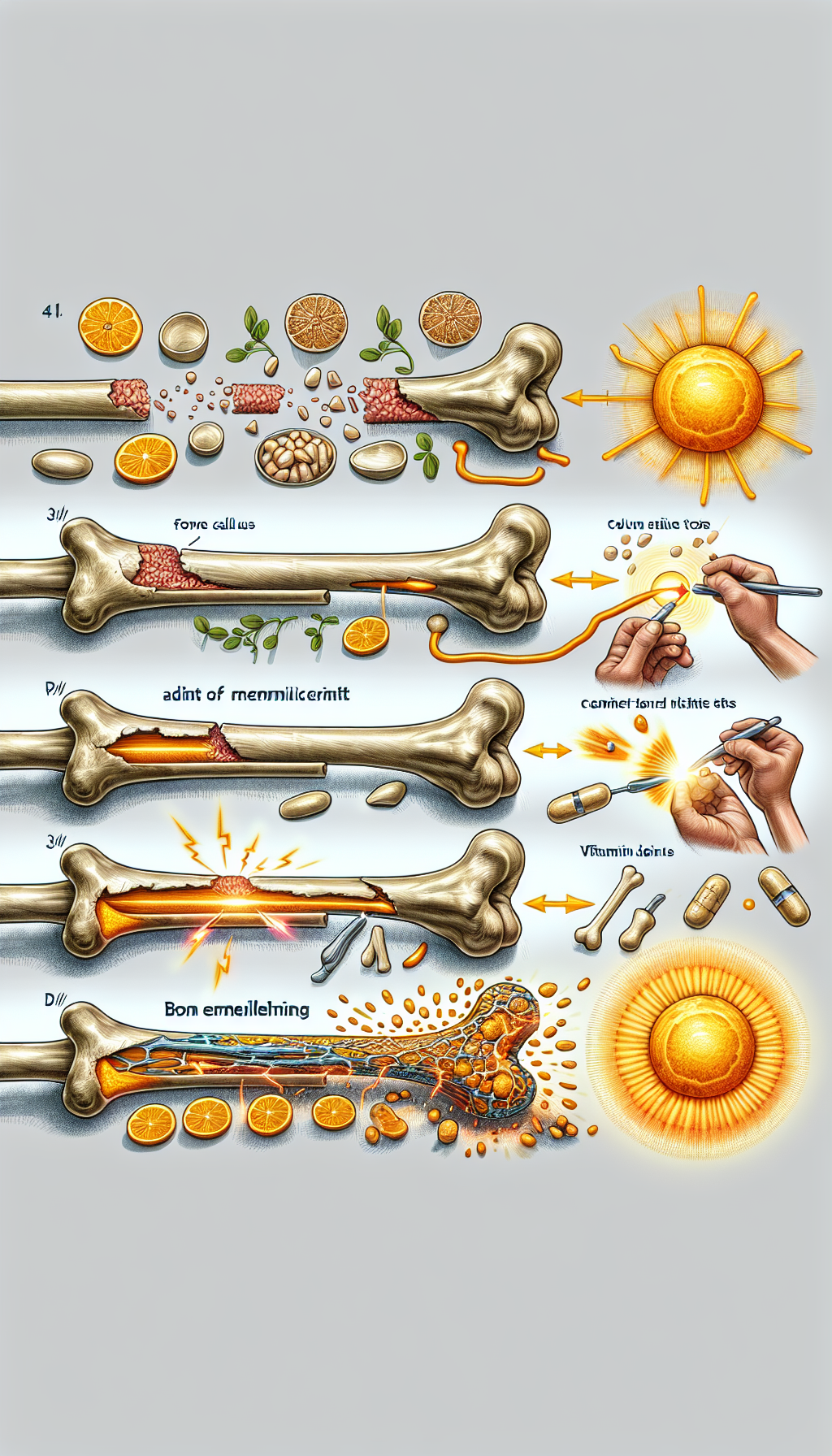Vitamin D, often referred to as the "sunshine vitamin," is crucial in maintaining bone health and facilitating the bone regeneration process. It not only helps in the absorption of calcium from the diet but also plays a significant role in bone growth and remodeling. In this comprehensive exploration, we will delve into the multifaceted role of Vitamin D in bone regeneration, discuss its sources and deficiencies, and offer strategies to optimize its levels for enhanced bone health.
Understanding Vitamin D’s Impact on Bone Health
At the cellular level, Vitamin D is vital for the regulation of calcium and phosphate homeostasis, which are the building blocks of bone tissue. The active form of Vitamin D, calcitriol, binds to Vitamin D receptors on the cells, influencing the expression of genes that regulate bone cell growth and differentiation. This is critical for the formation of new bone, especially during the repair of fractures or in conditions like osteoporosis, where bone density is compromised.
A deficiency in Vitamin D can lead to a decrease in calcium absorption, leading to lower mineralization of bone, which manifests as rickets in children and osteomalacia in adults. More chronically, it can contribute to osteoporosis—a condition characterized by porous and fragile bones.
For a deeper understanding of bone health and its complexities, one can visit Avix Health’s comprehensive guide to bone health.
Vitamin D Sources and Deficiency
The body synthesizes Vitamin D endogenously when ultraviolet rays from sunlight strike the skin and trigger Vitamin D synthesis. Dietary sources include fish, liver oils, fortified dairy products, and certain mushrooms. However, due to limited exposure to sunlight and dietary limitations, Vitamin D deficiency is increasingly common.
The Role of Vitamin D in Bone Regeneration
Vitamin D’s role in bone regeneration is multifaceted. It promotes the absorption of calcium and phosphorus from the gastrointestinal tract, which are essential minerals for bone formation. Furthermore, Vitamin D modulates the function of osteoblasts (cells that form new bone) and osteoclasts (cells that resorb bone), ensuring a balance between bone formation and resorption.
In instances of bone injury, Vitamin D levels can influence the healing process. Adequate levels of Vitamin D can enhance the regenerative capacity of bone by supporting the mineralization phase of bone repair. Conversely, insufficient levels may impair bone healing and regeneration.
For those interested in strategies that enhance calcium retention in bones, an article on Strategies for Enhancing Calcium Retention in Bones offers valuable insights.
Strategies to Optimize Vitamin D Levels for Bone Health
Sunlight Exposure
Moderate exposure to sunlight is one of the most efficient ways to boost Vitamin D levels. Spending 10-30 minutes in the sun several times a week can help most people produce sufficient Vitamin D.
Dietary Intake
Incorporating Vitamin D-rich foods into the diet, such as fatty fish, egg yolks, and fortified foods, can help maintain adequate levels of this nutrient.
Supplementation
In cases where sunlight exposure and dietary sources are insufficient, Vitamin D supplements can be an effective way to maintain optimal levels. It’s important to consult healthcare providers to determine the appropriate dosage and to monitor levels regularly.
Lifestyle Modifications
Maintaining a healthy body weight, reducing smoking, and limiting alcohol consumption can enhance Vitamin D metabolism and function in the body.
For a deeper dive into dietary considerations for bone health, refer to the article on Dietary Strategies to Improve Bone Mineral Density.
Vitamin D and Other Health Aspects
While the focus here is on bone regeneration, it’s noteworthy that Vitamin D also has implications for other aspects of health. Adequate levels of Vitamin D have been associated with reduced risks of certain cancers, improved immune function, and better cardiovascular health. Thus, maintaining optimal Vitamin D levels is beneficial for overall wellness.
For further exploration of how Vitamin D influences other health areas, such as cardiovascular health, visit Avix Health’s section on cardiovascular health.
Research and Further Readings on Vitamin D and Bone Health
Recent studies have emphasized the importance of Vitamin D in bone regeneration and overall skeletal health. The intricate relationship between Vitamin D metabolites and bone tissue is an ongoing subject of research, uncovering new understanding of how this vitamin influences bone healing at the molecular level.
For those keen on exploring this topic further, external resources such as the National Institutes of Health’s Vitamin D Fact Sheet for Health Professionals offer in-depth information on Vitamin D and its effects on bone health.
Additionally, the International Osteoporosis Foundation’s resources provide a wealth of knowledge on bone health, including the role of Vitamin D in preventing osteoporosis and fractures.
Conclusion
Vitamin D is a cornerstone in the edifice of bone health and regeneration. From its role in mineral homeostasis to its influence on bone-forming cells, Vitamin D is indispensable in maintaining a robust skeletal system. By ensuring adequate sunlight exposure, a balanced diet rich in Vitamin D, and appropriate supplementation when necessary, individuals can support their bone health and overall wellness.
For those interested in the interplay between exercise and bone health, the article on The Role of Exercise in Preventing Bone Loss provides practical recommendations.
In conclusion, while Vitamin D is only one piece of the puzzle, it’s a vital one, and ensuring that our bodies have enough of it can lead to stronger bones and better health outcomes, especially in the realm of bone regeneration.



